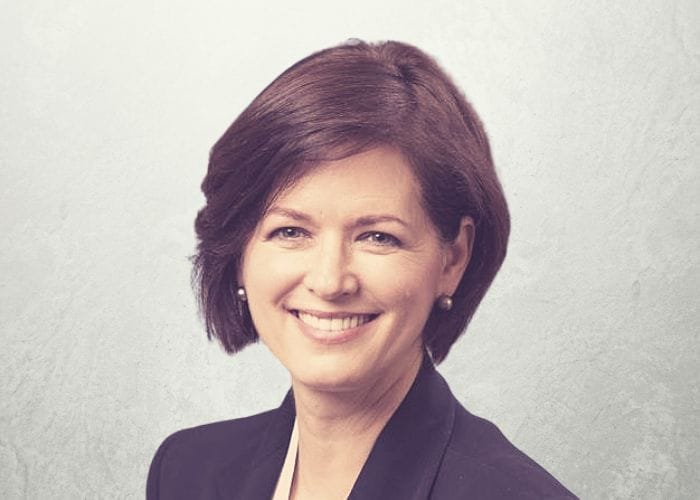Summing up the past year in five words, Marg Franklin, chief executive of the CFA Institute uses “compassion, imagination, improvisation, adaptability and responsibility”.
They are descriptors equally applicable to the industry as to her personally, and from where she sits as the head of the CFA Institute she has seen the industry, and her own organisation, innovate and adapt to meet the changing environment and changing needs of clients and employees.
“At the industry level we have seen three episodes so far. The first six months [after COVID hit] was ensuring the stability of the system, that clients and employees were well taken care of, employees were being taken of and all the essentials were in place,” she says in an interview from her home in New York. “The second six months was an opportunity to really think about what this means. Who ever thought traders could do what they do from home? And the third phase, we are in now is a reimagination of talent, what it means to work, and what does a hybrid model look like? What does it mean to come together and who needs to?”
The future of work in investment management is the next topic in the future of finance project being led at the CFA Institute by Rebecca Fender and Roger Urwin, and will be released later this month.
The study examines the success, or otherwise, of a flexible work environment drawing on a survey of 4600 members and their insights into changing skills and technology, changes to remote and flexible work, and the culture of an organisation. It also pairs the results of the CFA’s diversity work and the results of the experimental partner program which saw the CFA Institute work with more than 40 asset owners and managers as “experimental partners”, implementing diversity and inclusion action plans in their businesses.
The results of that program will be revealed in in May. The CFA Institute is also working on an “inclusion code” which has had input from asset owners and will be principles oriented.
“It’s been fascinating through COVID, those firms already putting inclusion and diversity into their systems have fared much better,” she says.
Franklin also says the organisation will refine the 20 action points in its D&I guide released in 2018 aimed at encouraging more diverse and inclusive workplaces.
“We are looking to refine our 20 strategies and start to integrate some of our other work. It is just as important to know what does work as what doesn’t.”
While gender is always an important diversity consideration she said the organisation is also looking at other aspects of diversity including race.
“The emphasis on inclusion will feature large in our research our social media and publications,” she said.
The CFA is also developing an ESG disclosure standard, which will be along the lines of the GIPS standards, and outline disclosure standards for investment products with ESG related features. The idea is that reliable, relatable disclosure will help eliminate greenwashing.
“We created an ESG standard so investors can better evaluate those funds,” Franklin says, with that standard also likely to be released in May.
The organisation also launched an ESG certificate
“We have had tremendous interest from individuals and firms who recognise that they need those skills, complements a suite of materials for professionals we have including the recent sustainability report.”
The power of technology
The past year also marked the first time that the CFA exam has been entirely computer-based, across all levels.
“We’ve been working on it for years and wanted to make sure the rigour of exams was there as we switched from paper to the computer testing,” Franklin says.
As a result of COVID the computer testing for level 2 and 3 was accelerated and now all levels are computer-based.
One of the benefits of the technological approach is the flexibility in the timing of testing.
“We did testing in February, some in March, and will do more in May, June, August and November. As a response to COVID have expanded our windows where previously it was only twice a year,” she said. “Life doesn’t work on two days a year, where there are always interruptions. This allows us to meet candidates with more flexibility in their scheduling. CFA is very democratic on the way in and meritocratic on testing, this allows us to be in more places and have more reach, and because they are smaller locations we can meet government requirements for gathering spaces.”
It also overcomes some of the costs of a paper-based approach which required huge venues and an enormous amount of logistics all over the world.
“CBT also allows us to do tasks and use tools that are more contemporary with what employers are looking for, and we are better able to match the skills,” she says. “We are grateful for all the work done in advance which meant we could successfully pivot to CBT. We won’t go back.”
Technology has played an increasing role in the industry during COVID, Franklin observes, and will continue to be a defining tool for industry leaders.
“For all the talk about technology the pandemic revealed it wasn’t pervasive everywhere. I do think technology is advancing, consultants have never been busier doing technology and digital transformation,” she says. “There will be people that charge ahead.”
The backdrop for investing continues to be exacerbated, she says, with the lower for longer environment, a search for returns and more investment in illiquid markets as well as bigger themes such as longevity risk playing their role.
But she says an important nascent trend that more industry players should pay attention to is resiliency.
“How do we create resiliency in the system. Managers have been assessing and need to assess where the singular points of failure are and ask the question do we have enough resiliency built in?”



